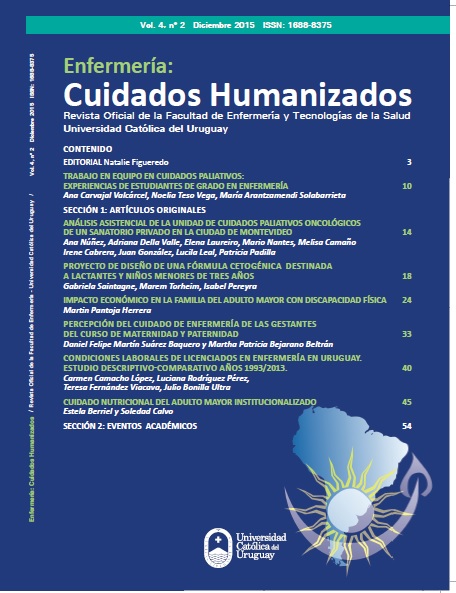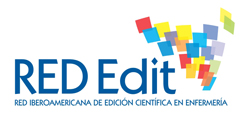NUTRITIONAL CARE OF THE INSTITUTIONALIZED ELDERLY
DOI:
https://doi.org/10.22235/ech.v4i2.890Keywords:
Elderly, Institutionalization, Food, Nutritional Status, Social Vulnerability.Abstract
The aim of this work is to obtain updated evidence regarding the nutritional care of the institutionalized elderly, as well as to determine the food and nutrition aspects that affect their vulnerability. The search was conducted using the following databases: IBESCS, LILACS, MEDLINE, SCIELO , EBSCO, VHL and Google Scholar, selecting items that were under five years of publication. The following descriptors were used: elderly, institutionalization, nutritional status, and vulnerability. 22 records were obtained after combination of different keywords; 11 papers were selected. The revised articles focused on those factors related to food or nutritional status that could cause the vulnerability of the institutionalized elderly. It is concluded that the menus provided in long-stay residences must be adapted to the nutritional recommendations of this kind of population, looking for variety and following their satisfaction. A paradigm shift is needed to improve the quality of life of elderly residents, looking for food preferences and socio-cultural aspects that give identity and meaning to their life. The training of staff responsible for food in nursing homes appears to be a key point. They should be taken as reference standards and nutritional guidelines with proven evidence. It is necessary to plan a local study addressing the issue of eating habits in this population.
Downloads
References
(1) Ministerio de Salud Pública, Dirección General de la Salud, División Salud de la población . Montevideo: Programa Nacional del Adulto Mayor; 2005. [Internet]. [citado el 01 Ago 2015]. Disponible en: http://www.msp.gub.uy/sites/default/files/Programa_Adulto_Mayor%5B1%5D.pdf
(2) Instituto Nacional de Estadística Censo Uruguay; 2011.[Internet]. [citado el 01 Ago 2015]. Disponible en: http://www.ine.gub.uy/censos2011/index.html
(3) Dirección de Desarrollo Institucional.Programa del Adulto Mayor Guía de Cuidados de Salud Para Adultos Mayores Montevideo. Documento Técnico: 004/2011. [Internet]. [citado el 01 Set 2015]. Disponible en: www.asse.com.uy/andocasociado.aspx?5065,23917
(4) Vergés A. Prácticas de alimentación y estado nutricional de las personas institucionalizadas. 1ª ed. Barcelona: Senda editorial S.A.; 2011.
(5) Bezares, V et al. Evaluación del estado nutricional en el ciclo
vital humano. México: Editorial Mc Graw Hill; 2012.
(6) Oliveira RB de A, Veras RP, Prado SD. O fim da linha?: etnografia
da alimentação de idosos institucionalizados-reflexões a partir das contribuições metodológicas de Malinowski. Rev Bras Geriatr Gerontol. 2010; 13(1):1 33–43.
(7) Giraldo FAF, Montoya LMA. Aspectos socioculturales y técnico-nutricionales en la alimentación de un grupo de adultos mayores del centro gerontológico Colonia de Belencito de Medellín-Colombia. Perspect En Nutr Humana. 2010; 12(1): 61–74.
(8) Camina Martín MA, Barrera Ortega S, Domínguez Rodríguez L, Couceiro Muiño C, de Mateo Silleras B, Redondo del Río MP. Presence of malnutrition and risk of malnutrition in institutionalized elderly with dementia according to the type and deterioration stage. Nutr Hosp. 2012; 27(2): 434–40.
(9) Volpini MM, Frangella VS. Nutritional assessment of institutionalized
elderly. Einstein São Paulo Braz. 2013; 11(1):32–40.
(10) L ehn F, de Sousa Coelho HD, Garcia MT, Scabar LF. Estado
nutricional de idosos em uma instituição de longa permanência. J Health Sci Inst. 2012; 30(1) :53–8.
(11) Milà Villarroel R, Abellana Sangrà R, Padró Massaguer L, Farran Codina A. Assessment of food consumption, energy and protein intake in the meals offered in four Spanish nursing homes. Nutr Hosp. 2012;27 (3): 914–21.
(12) Sánchez-Campillo M, Torralba C, López MÁ, Zamora S, Pérez-
Llamas F. Strategies for improving nutritional value of the meals offered by public nursing homes for the elderly. Nutr Hosp. 2010;25 (6): 1014–9.
(13) de Oliveira JP, Marcolino JF, de Andrade MS. A formação do cuidador de idosos institucionalizados: ênfase na rotina de alimentação. Estud Interdiscip Sobre O Envelhec [Internet]. 2011 [citado 10 Ago 2015];16 (2). Disponible en: http://www.seer.ufrgs.br/RevEnvelhecer/article/view/12428/0
(14) Cibele Maria de Holanda Lira D, Fabiana Aguiar B, Katia Lima B, Luciane Soares L. Capacidade funcional de idosos com doenças crônicas residentes em Instituições de Longa Permanência. Rev Bras Enferm. 2013; 1(6): 914.
(15) Marinho LM, Vieira MA, Costa S de M, Andrade JMO. Degree
of dependence of elderly residents in geriatric longterm care facilities in Montes Claros, MG. Rev Gaúcha Enferm EENFUFRGS. 2013;34(1):104–10.
Downloads
Published
How to Cite
Issue
Section
License
Copyright (c) 2015 Enfermería: Cuidados Humanizados

This work is licensed under a Creative Commons Attribution 4.0 International License.

















